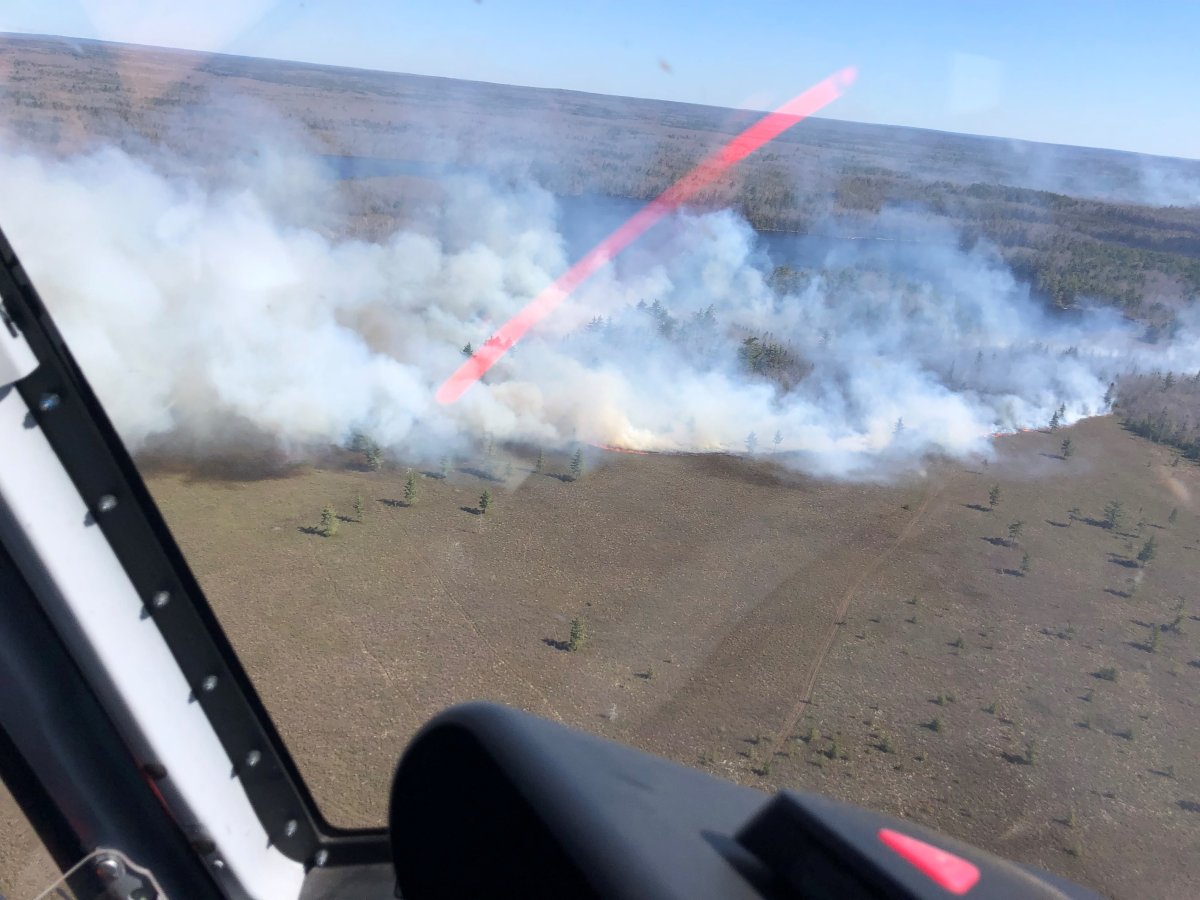Provincial crews are battling a growing forest fire burning near South Horseshoe Lake in Yarmouth County, N.S., which sent thick smoke into the air and prompted an air quality statement from Environment Canada.

The out-of-control wildfire is estimated to cover 1,000 hectares as of Tuesday night.
Kara McCurdy, the wildfire prevention officer for the Department of Natural Resources and Renewables, said when firefighters initially responded to the fire late Monday afternoon, it was estimated to be about 50 hectares.
A CL-415 water bomber from Newfoundland and Labrador arrived Tuesday evening to help in the efforts.
There were two helicopters on scene Tuesday afternoon with 12 crew members from Yarmouth and Shelburne working to knock down the flames.
McCurdy attributed the fire’s rapid growth to unfavourable weather conditions.
“The fire’s been hard to contain because the winds are very high down in the western region, and our humidity’s super low right now,” she said.
“That means we’re in crossover conditions, which means the fuel’s super dry and the fire is spreading really fast.”
She also said this is the time of year known as the “spring dip” — when trees are putting all of their energy into new growth, which can make forests “really dry.”
McCurdy added that as of Monday night, there were nine forest fires burning across the province: two in Yarmouth, one in Digby, one in Kings County, one in Queens County, one in West Hants, one in Colchester, and two in North Sydney.

Get daily National news
“We usually see a huge increase in fire spread between mid-May to the second week of June this time of year,” she explained.
Fire likely caused by people
She said fires like the one in Yarmouth could take several days to finish knocking down, since the forecast indicates the weather conditions won’t be improving in the coming days.
“They could be there for up to a week,” she said.
McCurdy said the fire is in a “boggy” area with a lot of sparse spruce trees, not close to any homes or cottages. It’s a remote area not accessible by vehicle, but there are ATV trails, she said, adding that they can’t say what exactly may have caused the fire.
“We do know that we haven’t had any lightning … so that pretty much knocks it to a human cause,” she said.
McCurdy stressed that people need to follow the province’s burn restrictions.
“The burn restrictions are set with public safety in mind, so making sure that you check in at 2 o’clock to see if you’re allowed to burn or not,” she said.
Tuesday morning, Environment Canada issued a special air quality statement for Yarmouth County, saying “elevated pollution levels are expected or occurring.”
The statement, updated just after 11 a.m., said the fire about 40 kilometres northeast from the town of Yarmouth is producing thick smoke which is moving westward.
“Smoke could be affecting air quality from Quinan westward to Sandford and Beaver River,” it said.
“Individuals may experience symptoms such as increased coughing, throat irritation, headaches or shortness of breath. Children, seniors, and those with cardiovascular or lung disease, such as asthma, are especially at risk.”
Environment Canada is advising those with breathing difficulties to stay inside.
“Find an indoor place that’s cool and ventilated. Using an air conditioner that cools and filters air may help. If you open the windows you may let in more polluted air,” it said.
“If your home isn’t air-conditioned, consider going to a public place (library, shopping mall, recreation centre) that is air-conditioned.”








Comments
Want to discuss? Please read our Commenting Policy first.